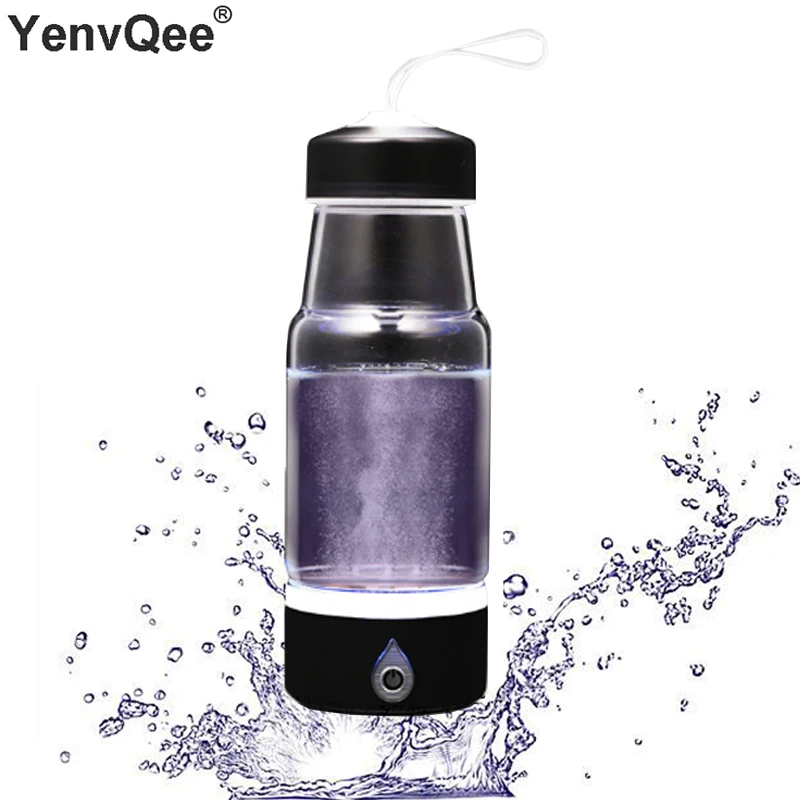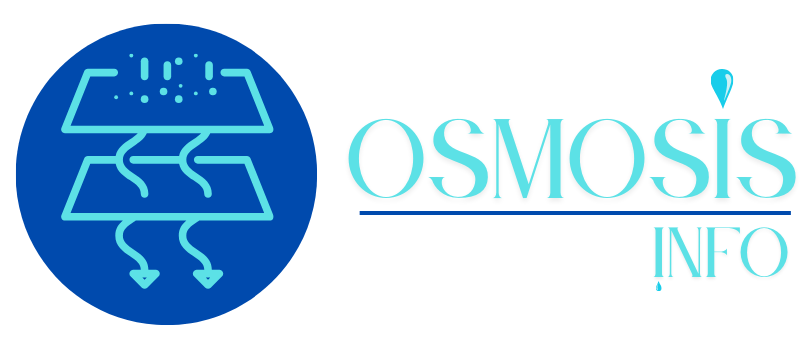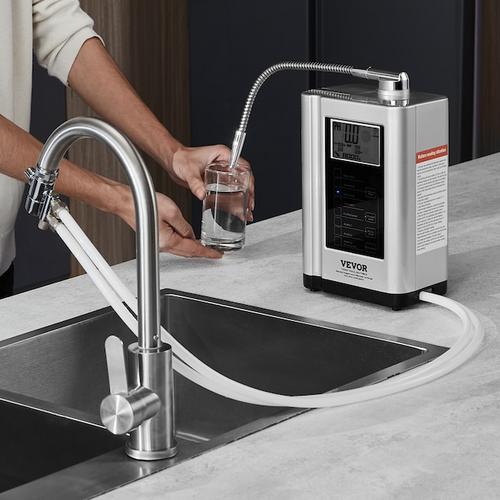Introduction To Water Ionization And Its Potential Health Benefits
Every morning, as I fill my glass at the kitchen sink, I’m reminded that ordinary tap water can be so much more than it seems. Water ionization—a process that splits filtered water into two streams, one alkaline and the other acidic—feels almost like kitchen alchemy. The idea is simple: tap water passes through an internal filter that removes chlorine, heavy metals, and certain contaminants while preserving essential minerals, and then a low-voltage current runs through platinum-coated titanium plates to separate positively charged ions (like calcium and magnesium) from negatively charged ones (like chlorine) [1][2]. What you end up with is silky, mineral-rich alkaline water for drinking and a gentle, naturally acidic stream you can use for cleaning or skincare.
At first, I confess, I was skeptical—could water with a slightly higher pH really ease my occasional post-lunch indigestion or help muscles rebound quicker after a weekend bike ride? Friends swore by that lighter mouthfeel and subtle taste improvement, and I soon noticed that sipping water around pH 9.5 felt smooth on my tongue, almost like a whisper of refreshment. Some studies suggest that antioxidant-rich alkaline water—indicated by a negative oxidation-reduction potential (ORP)—can help neutralize free radicals, though large-scale clinical proof remains elusive [5]. Still, there’s something compelling about science meeting daily habit in such a tangible way.
Beyond the drinkable stream, the acidic outflow—usually hovering around pH 3.5 to 6.0—can tackle bacteria and act as a natural toner, replacing harsh chemicals with a gentle spray directly from your faucet [3]. I’ve spritzed it on cutting boards, sponges, even my face after a long day, marveling at how minimal effort yields a fresh, clean sensation. If you’re intrigued by the promise of this dual-purpose system, take a peek at our detailed guide on water ionizers for home use to explore model comparisons, pH settings, and real-world tips for turning your tap into a tailored hydration and cleaning hub.

Installation Made Simple For Your Water Ionizer
Installing a water ionizer isn’t rocket science—it’s more like setting up a coffee maker, really. Step one is clearing some real estate under the sink or on the counter, then unpacking the diverter valve, tubing, filter cartridges, and mounting bracket. Most units come with a faucet adapter that clips or screws onto standard kitchen taps. I found the quick-start guide straightforward: match each hose to its inlet and outlet port, tighten by hand, and give a gentle tug to confirm they’re secure. Within ten minutes, you can go from a box of parts to a fully connected system ready to electro-split your water [1].
Next, connect the cold-water line to the ionizer’s inlet, and route the outlet tube back to either your glass or a secondary spray nozzle for acidic water. It helps to slide the unit snug against the wall—prevents accidental bumps or hose kinks—and to keep the filter area accessible for fast swaps. Once the hoses are in place, plug the machine into a grounded outlet and power it on. You’ll cycle through each pH setting, running both alkaline and acidic streams for a couple of minutes to flush factory residue and dust from the plates. Watching two distinct flows emerge for the first time—with the gentle hiss of ionization—feels almost magical, a reminder of how electricity and water can team up for everyday convenience [2].
Final step: open the diverter valve slowly, check for drips, and taste your first glass. That crisp, smooth sip usually prompts a grin—no more plastic jugs cluttering the fridge or struggling with heavy bottled water packs. Just remember: a water ionizer tweaks pH and ORP rather than acting as a deep purifier. If your tap water has high levels of chemical contaminants, pairing the ionizer with a dedicated reverse-osmosis or carbon filter upstream is a smart move.

Best Practices For Maintaining Water Ionizers
Treat your water ionizer kindly, and it will return the favor with years of crisp, mineral-rich water. First on the to-do list is filter replacement: most units recommend swapping cartridges every 6–12 months, or roughly every 3,000–6,000 liters, depending on your tap’s hardness and sediment load. Let a filter overstay its welcome, and you’ll notice slower flow, erratic pH readings, and less zing in that morning glass—performance can dip by up to 30% when filters are overdue [2].
Second, schedule a deep clean every three to four months. Mineral scale from hard water loves to cling to platinum-coated titanium plates, dulling the electrolysis process. Most machines have a dedicated acid-clean cycle; if yours doesn’t, run a citric-acid solution through it to dissolve buildup. It only takes 15–20 minutes and saves you from costly service calls—and honestly, it’s oddly satisfying watching brown scale drop away like rust from an old bike frame [5].
Finally, keep hardness in check before it reaches the ionizer. If you live in a notoriously hard-water area, pairing your unit with a template-assisted crystallization system upstream can halve your maintenance and extend electrode life. During each filter swap, inspect hoses and fittings for mineral spots or kinks—nip leaks in the bud to ensure steady pressure and consistent performance. A little attention goes a long way; think of maintenance as self-care for your appliance. And trust me, when that first batch of pH 9.5 water flows freely after a deep clean, you’ll feel proud of the effort.

Environmental Benefits Of Water Ionizers
Once you switch to a home water ionizer, the most visible change is probably the empty space in your recycling bin. Studies estimate that over half a trillion single-use plastic bottles are discarded globally each year, choking landfills and oceans alike [5]. By filling reusable bottles from your kitchen tap, you’re directly cutting that staggering figure—one household at a time—but the ripple effect is huge.
It’s not just plastic you’re saving. Bottled-water production demands immense energy for packaging, transport, and refrigeration. A water ionizer, by contrast, uses a small electric current to tweak pH and ORP, adding mere cents to your power bill each month versus the carbon emissions tied to shipping pallets of water. That’s a win for your wallet and the planet [1]. I still recall the moment I realized our family had cut nearly 300 bottles in a single season—felt like we’d turned off a miniature landfill.
Plus, the versatility of that acidic stream means fewer chemical cleaners under the sink. From disinfecting cutting boards to misting tomatoes off their skins before slicing, it’s a mild, effective alternative that minimizes harsh biocides and toxic fumes. In the small but meaningful ways—like using less single-use plastic and toxic cleaners—your water ionizer becomes an eco-hero on the countertop, quietly helping you tread lighter on the earth.
Essential Features Of A High-Quality Water Ionizer
When shopping, start with the filtration stage. A multi-stage filter should remove chlorine, lead, and heavy metals without stripping out calcium and magnesium—those minerals power the ionization process and give alkaline water its character. Look for NSF certification or equivalent endorsements; they’re like trust badges for your filter [1]. A robust filter not only enhances taste but protects the electrodes, extending your system’s lifespan.
Speaking of electrodes, platinum-coated titanium plates are the gold standard—literally and figuratively. They resist corrosion, maintain even current flow, and deliver stable pH and ORP readings over thousands of hours. I once compared two models side by side: the sturdier plates translated into consistently smooth alkaline water at pH levels from 7.0 up to 11.5, with minimal drift over time [2][4]. Hotspots or uneven plating, by contrast, spelled early replacement.
Finally, digital controls and clear readouts are worth their weight in gold. Being able to dial in your desired pH—say 8.5 for daily hydration or 3.5 for spritzing your greens—takes the guesswork out of the equation. Integrated sensors that warn you if your source water’s mineral content falls outside ideal ranges are another smart feature. For model comparisons and rankings, take a look at our analysis of the best water ionizer for home use.
Financial Considerations When Buying A Water Ionizer
Investing in a water ionizer can feel like a leap, but it’s one that pays dividends over time. Entry-level systems start around $600, while feature-rich models with multiple pH levels and advanced filtration can run $2,500 to $3,000 [4]. Then factor in annual filter costs—typically $50 to $100—and occasional cleaning solutions. If you’re not a DIYer, add modest installation fees. I once balked at the sticker shock until I tallied my bottled-water spending—over $200 a year—that vanished once the ionizer was in place.
Warranties are crucial. Basic models often include a 1-year parts-and-labor guarantee, while top brands offer 5–10 years of coverage and sometimes free filter rebates for the first few cycles [3]. Scrutinize maintenance and service plans—those fine-print details can save you from unexpected repair bills. Over three to five years, the break-even point usually arrives as bottled-water costs decline, leaving you with pure savings and pristine hydration.
Debunking Common Myths About Alkaline Water
Alkaline water often gets labeled a panacea—flush toxins, beat fatigue, balance your body’s pH. But much of that hype outpaces the science. Our blood pH stays tightly regulated by kidneys and lungs; sipping water at pH 9.5 won’t dramatically shift your internal chemistry [5]. The real benefit of staying hydrated—any water—accounts for most ‘detox’ effects people report.
Another misconception is that alkaline water supercharges metabolism by neutralizing stomach acid. A few small studies hint at minor improvements in heartburn or acid reflux symptoms, but large-scale clinical trials are scarce, and over-neutralizing acid can even impair digestion [5]. Then there’s the idea that ionizers double as heavy-duty purifiers: they don’t remove nitrates, fluoride, or many industrial chemicals. They tweak pH and ORP after a basic filter—so if you need deep contaminant removal, consider a reverse-osmosis unit upstream.
Incorporating Alkaline Water Into Daily Life
Making ionized water part of your routine can be as simple as revising your morning ritual. I start each day with a tall glass at pH 9.0 right after yoga, savoring that silky mouthfeel before breakfast. Research suggests that antioxidant-rich alkaline water—characterized by negative ORP—might help soak up free radicals, giving workouts and busy days a little edge [2]. Oddly enough, it feels less like medicine and more like a treat you deserve.
For a fun twist, infuse your alkaline water with fruit and herbs—strawberry-basil or grapefruit-rosemary. Blend into smoothies for a flavor boost, or chill overnight for spa-style detox jars. In the kitchen, using pH-balanced water in coffee or tea can subtly mellow acidity, refining the flavor profile. And don’t overlook beauty uses: a gentle spray on the face or a post-shower hair rinse can leave skin and locks feeling soft and vibrant. Whether you’re sipping or spritzing, alkaline water adds a dash of ritual and a splash of science to everyday life.
“`html
Complete Top Picks Comparison – 23 Products
| Product | Source | Price | Rating | Image | Buy |
|---|---|---|---|---|---|
| Hydrogen Water Bottle Generator – 3 Min SPE PEM Tech, 2025 Model, 420ML Portable Hydrogen Water Machine for Travel, Wellness & Recovery, Ideal for Kids, Men & Women (Silver) | Amazon | $29.99 | ★★★★☆ |  | View on Amazon |
| Hydrogen Water Bottle Generator, 1400ppb Portable Water Ionizer Machine with SPE/PEM Technology in 3-Minute Electrolysis, Rechargeable Hydrogen Rich Glass Cup for Home Office Travel & Fitness | Amazon | $29.99 | ★★★★☆ |  | View on Amazon |
| Enagic Leveluk K8 Water Filter Machine | Amazon | $2499.95 | ★★★★☆ |  | View on Amazon |
| Hydrogen Water Bottle, Hydrogen Rich Water Generator, Rechargeable Portable Glass Hydrogen Water Ionizer Machine with SPE and PEM Technology, for Daily Office Home Travel and Fitness Drinking | Amazon | $19.99 | ★★★★☆ |  | View on Amazon |
| Hydrogen Water Bottle Generator, Portable Rechargeable aquahealth Hydrogen Water, Hydrogen Water Ionizer Machine, with SPE/PEM Technology, for Home Office Travel Fitness Drinking | Amazon | $35.52 | ★★★★☆ |  | View on Amazon |
| Aqua Ionizer Deluxe 7.0 | Water Ionizer | Alkaline Water Filtration System | Produces pH 4.5-11.0 | Up to -800mV ORP | 4000 Liters Per Filter | 7 Water Settings | Amazon | $1258.88 | ★★★★☆ |  | View on Amazon |
| Bluevua RO100ROPOT-UV Reverse Osmosis System Countertop Water Filter – 6 Stage Purification with UV and Remineralization, Counter RO Filtration, Portable Water Purifier | Amazon | $409.00 | ★★★★★ |  | View on Amazon |
| Tyent – Q-Series Water Ionizer – Dual Filtration System – Hydrogen Enhanced Water Purification – Adjustable pH Settings – Backlit Color Touch Panel & Auto-Flow Stop | Amazon | $1195.00 | ★★★★☆ |  | View on Amazon |
| Hydrogen Water Bottle – Portable, Rechargeable, LED Timer,3 Work Mode, Aluminum and Glass,360ML,Hydrogen Water Ionizer Machine with PEM/SPE Technology, Suitable for Office,Home,Gym Outdoor (Grey) | Amazon | $149.99 | ★★★★★ |  | View on Amazon |
| Waterdrop Slim Alkaline Water Filter Dispenser, Large 35-Cup, Up to PH 9.5, Healthy, Clean & Toxin-Free Mineralized Alkaline Water, 100-Gallon, BPA Free, Black (1 Filter Included) | Amazon | $39.99 | ★★★★★ |  | View on Amazon |
| 420ML Portable Rich Hydrogen Generator Cup Water Filter Ionizer Pure H2 Hydrogen alkaline Bottle Electrolysis Drink Hydrogen | AliExpress | $33.11 | ★★★★★ |  | View on AliExpress |
| Hot Selling 5-Stage Alkaline Reverse Osmosis Water Filter Smart Home Desktop Mini Aquarium Purifier for Household and Hotels | AliExpress | $126.09 |

